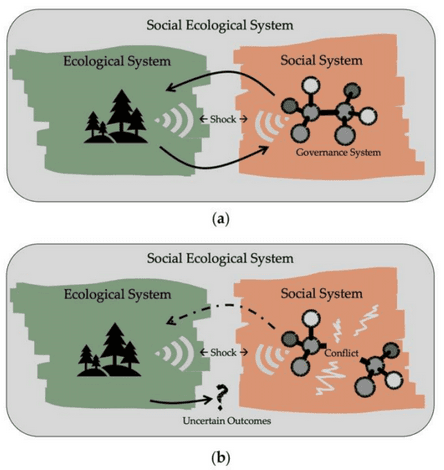
Socio-Ecological systems science for conservation conflict resolution
Research on socio-ecological systems (SES) for conservation conflict resolution is grounded in the recognition that environmental challenges are inherently complex, shaped by the dynamic interplay between ecological processes and diverse social, cultural, economic, and political dimensions. This research line views conservation conflicts not merely as disputes over natural resources or biodiversity protection but as symptoms of deeper governance, equity, and value-based tensions between stakeholders with differing interests, worldviews, and power. A key principle is the systems-thinking approach, which emphasizes the interdependencies, feedbacks, and adaptive capacity of coupled human–natural systems. By framing conservation conflicts within the SES framework, researchers seek to uncover the root causes of conflict—such as unequal access to resources, historical injustices, or competing land-use priorities—while also identifying pathways toward coexistence, resilience, and sustainable governance. Central to this work is the integration of diverse knowledge systems and stakeholder perspectives, including scientific, local, and Indigenous knowledge, recognizing that effective conflict resolution requires inclusive, participatory, and context-sensitive processes. The research places strong emphasis on governance structures and institutional arrangements, exploring how rules, norms, and decision-making processes can mediate or exacerbate tensions. It highlights the importance of legitimacy, transparency, and trust in fostering collaborative solutions and adaptive management strategies. Power asymmetries are critically examined, acknowledging that conservation initiatives often privilege certain groups over others, leading to marginalization, resistance, or unintended socio-environmental outcomes. Addressing these asymmetries is essential for achieving just and enduring outcomes. Another core principle is the role of values and perceptions—how different actors conceptualize nature, conservation, and development—and how these influence their behavior, expectations, and willingness to cooperate. The research also explores trade-offs and synergies between conservation goals and human well-being, aiming to identify win-win scenarios where biodiversity protection aligns with social justice, livelihood security, and cultural identity. In this regard, conflict is not seen solely as a problem to be eliminated but as a potential driver of positive change when managed constructively. Methodologically, the field is inherently transdisciplinary, drawing from ecology, political science, sociology, psychology, economics, and conflict studies. It employs both qualitative and quantitative tools, including participatory mapping, scenario analysis, stakeholder interviews, institutional analysis, and agent-based modeling to understand system dynamics and anticipate the impacts of different interventions. Reflexivity, humility, and ethical engagement are emphasized throughout the research process, as scholars often work directly with communities, NGOs, and policymakers in sensitive and contested settings. The goal is not to prescribe one-size-fits-all solutions but to co-develop locally tailored strategies that are ecologically sound, socially acceptable, and politically feasible. Finally, this research line contributes to broader debates on conservation futures in a rapidly changing world, where biodiversity loss, climate change, and social inequalities converge. It advocates for adaptive and polycentric governance approaches capable of responding to uncertainty and change, and for embedding justice, resilience, and co-management principles at the heart of conservation planning. By embracing complexity and pluralism, socio-ecological systems research for conservation conflict resolution seeks to transform conflict into opportunity, bridging divides between people and nature while fostering more inclusive and sustainable socio-environmental futures.